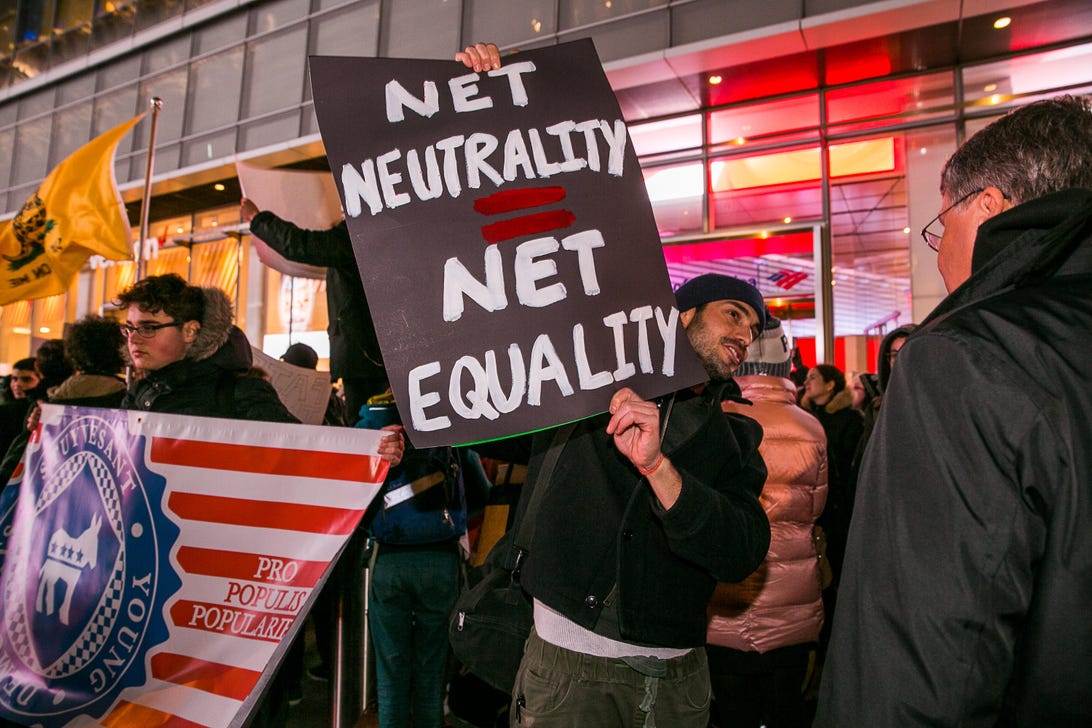
In a big blow to broadband companies, a federal appeals court upheld an earlier ruling that allows California to enforce its net neutrality law.
Sarah Tew/CNETA federal appeals court on Friday upheld California’s net neutrality law, rejecting an attempt by broadband industry trade groups to prevent the state from enforcing it. The ruling is the latest twist in a decades-long battle to put in place rules of the road for the internet.
The Ninth Circuit Court of Appeals in a 3-0 vote upheld a previous ruling, which means the state can continue to enforce the law. California adopted the new rules in 2018 after a Republican-led Federal Communications Commission in 2017 repealed federal rules that had been established under President Barack Obama.
Telecom and broadband industry groups had sued to get the state law thrown out, arguing that since federal net neutrality protections were dismantled, the state had no jurisdiction to regulate broadband service. But the court ruled that since the FCC as part of its repeal of net neutrality protections reclassified broadband as an information service rather than telecommunications service, it abdicated its authority and therefore couldn’t preempt a state law, which included the 2018 California law, SB-822.
“The FCC can not preempt SB-822 because it gave up its full regulatory authority by reclassifying broadband as a Title I information service,” the court said.
California’s law, which codifies federal protections that were thrown out in 2017, bans internet service providers from slowing down or blocking access to websites or applications. It also prohibits broadband companies from charging fees to companies to deliver their service faster than a competitor’s service. It also goes further than the Obama-era FCC net neutrality protections and also prohibits practices such as zero-rating, which is the bundling of access to certain content or services for free as part of broadband service. An example of such a service is a promotion once offered by AT&T, which exempted its own streaming services from its wireless customers’ data caps.
The Ninth Circuit case has been closely watched by industry groups and policy makers, because it could have implications for other states. Six other states in addition to California have adopted net neutrality laws: Colorado, Maine, New Jersey, Oregon, Vermont and Washington. Several other states have introduced some form of net neutrality legislation. Attorneys general in New York, Massachusetts and 16 other states filed a brief urging the court to uphold the California law as a valid exercise of state police power.
The appeals court noted the importance of the case and said that “the stakes in this case are high for the industry and consumers.” It went on to say that without net neutrality rules, internet providers could “open the door for anticompetitive, discriminatory behavior that could disadvantage important segments of society.”
The FCC during the Obama administration had adopted net neutrality rules in 2015. The rules were then overturned by the Trump-era FCC in 2017. California’s legislature responded by adopting a state law requiring net neutrality in August 2018.
California state senator Scott Wiener, a Democrat from San Francisco, who authored SB-822, said the decision marked a huge win for a free and open internet.
“This is a victory for everyone who uses the internet – who needs it for work, school, or simply connecting with family and friends,” he said in a statement. “Given the importance of the internet in our society – now more than ever – this is a landmark day for our state.”
FCC Chair Jessica Rosenworcel said Friday that the decision was “good news” and added the FCC needs “once again to make it the law of the land.”
Net neutrality to make a comeback
Net neutrality is the principle that all traffic on the internet should be treated equally, regardless of whether you’re checking Facebook, posting pictures to Instagram or streaming movies from Netflix or Prime Video. It also means companies like Comcast, which owns NBCUniversal, can’t favor their own content over that of a competitor.
Supporters of net neutrality say rules are necessary to ensure broadband companies aren’t taking advantage of their power over the infrastructure that delivers content to your internet-enabled TVs, laptops, tablets and smartphones. But broadband companies and Republicans in Congress and on the FCC say the old rules gave the agency too much power, stifling broadband investment.
The result for the past decade has been a ping-ponging of federal net neutrality regulations based on the political party in charge.
The back and forth is expected to continue as President Joe Biden’s pick to fill a Democratic seat on the FCC comes up for a committee vote next week. Since Biden’s inauguration last year, the FCC has operated with a 2-2 split between Democrats and Republicans. Gigi Sohn, who Biden nominated in October, if confirmed, would be the third Democrat on the FCC necessary to reinstate net neutrality rules.
Once Sohn is made a commissioner, it’s expected the FCC will move to adopt net neutrality protections and also reestablish the FCC’s authority over broadband providers. Rosenworcel, who’s now in her third term on the FCC, was a commissioner who voted for the 2015 rules. She also voted against the repeal in 2017 and was outspoken about her opposition. Sohn has spent much of her career advocating for net neutrality protections. As an adviser to former FCC Chair Tom Wheeler, she helped craft the 2015 rules.
The big question is how far the agency will go in terms of reestablishing the rules. Both Rosenworcel and Sohn made it clear during their Senate confirmation hearings that in addition to bringing back the 2015 rules that prohibit broadband providers from blocking and throttling traffic, the FCC needs to reestablish its authority over broadband.
Though Democrats will be eager to get started, the process to reinstate net neutrality and reestablish FCC authority won’t be quick. Once Democrats gain a majority, they’ll have to issue a notice of proposed rulemaking and open the proposal for public comment. All told, new rules wouldn’t likely be in place for at least a year.



